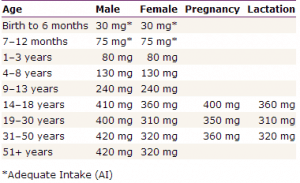Magnesium: How does it work?
Magnesium is magic for bowel movements, but how does it really work? What is the best kind of magnesium? Can you take too much magnesium? These were questions that I really did not know the answers to, so I decided to do some research.
Magnesium is an abundant mineral in the body. It participates in more than 300 enzyme systems that regulate chemical reactions in the body, including:
- Protein synthesis
- Muscle and nerve function
- Blood glucose control
- Blood pressure regulation
The adult body contains 25 grams of magnesium, 50-60% present in the bones, and the remaining is present in soft tissues. Less than 1% is in the blood serum. Normal serum magnesium levels are between .75 and .95 millimoles. Hypomagnesia is less than .75 mmol. Magnesium homeostasis is largely controlled by the kidneys which typically excretes about 120 mg of magnesium into the urine each day.
There is conflicting evidence on accurate magnesium assessment which can include assessing magnesium concentration in erythrocytes, saliva and urine or performing a magnesium loading test(load the body with magnesium and determine what the body tolerates). Below is the recommended daily allowance for magnesium which means the average daily level of intake sufficient to meet the nutrient requirements of nearly all(97-98%) of healthy individuals.
Magnesium is found in green leafy vegetables, nuts, seeds, whole grains. Foods with dietary fiber also provide magnesium, so this would include breakfast cereal that is fortified. About 30-40% of magnesium that is consumed is absorbed by the body.
Magnesium is the primary ingredient in some laxatives, as well as remedies for heartburn and upset stomach due to acid indigestion.
Why would my magnesium levels be low?
Magnesium deficiency is generally uncommon, because the kidneys limit excess urinary excretion when levels are low. Magnesium deficiency signs include: loss of appetite, nausea, vomiting, fatigues, weakness. As the deficiency worsens, numbness, tingling, muscle contractions and cramps, seizures, personality changes, abnormal heart rhythms, and coronary spasms can occur. Those groups at risk for magnesium insufficiency are generally people that do not consume enough food or those that have medical conditions that require medications which reduce magnesium absorption. These specific disease/populations may be at risk for magnesium insufficiency: GI disorders, type 2 diabetes, alcohol dependence, older adults.
Can you have too much magnesium?
Too much magnesium from food generally does not pose a risk to healthy individuals because the kidneys eliminate excess amounts in the urine. However, high doses of magnesium from supplements or medication can cause diarrhea and can be accompanied by nausea and abdominal cramping. This works due to the magnesium salts that cause osmotic activity in the intestines and colon that stimulate gastric motility.
Magnesium toxicity can occur at doses > 5000 mg/day, and there are rare cases of hypermagnesia causing death. Symptoms of magnesium toxicity include hypotension, nausea, vomiting, facial flushing, retention of urine, ileus, depression, lethargy, before progressing to muscle weakness, difficulty breathing, extreme hypotension, irregular heartbeat, and cardiac arrest.
So what are the long term risks of using this?
When treating patients with constipation type disorders, magnesium seems to work great. The question I seem to often get is, can I take this long term? What are the long term effects? I did some research and couldn’t seem to come up with any good long term studies that examined potential long term outcomes. I read a few blogs of people that had been using magnesium oxide or magnesium citrate for 20 + years and a few people found that they were dizzy, fatigued, and irritable. In all of these cases, their MD advised them to decrease the dosage.
What are the different kinds of magnesium that can help with constipation?
- Magnesium Oxide: used as a laxative with high concentrations but poor levels of bioavailability meaning that it will be the least absorbed. Generally prescribed in higher doses 1000-2000 mg.
- Magnesium Citrate: lower concentration but high level of bioavailability(absorption) Used to induce bowel movement
- Magnesium Lactate: moderate concentrations, but higher levels of bioavailability. Should be avoided by those with kidney disease or kidney-related problems best
- Magnesium Glycinate: Less magnesium by weight and much less absorption into the GI system. Best for those with IBS(constipation dominant) as it bypasses GI system and produces quick results when used in a powder form.
So after all of this research, the conclusion I have come to is that it seems magnesium is safe and effective to use, however should be avoided in those with poor kidney function. Everyone responds differently, so you may need to try a few different kinds of magnesium before finding a good fit. If you are in doubt of what to try or appropriate dosage, speak to your doctor!
References
https://ods.od.nih.gov/factsheets/Magnesium-HealthProfessional/
http://www.globalhealingcenter.com/natural-health/types-of-magnesium/
http://peoplesrx.com/the-best-kind-of-magnesium-for-you/


